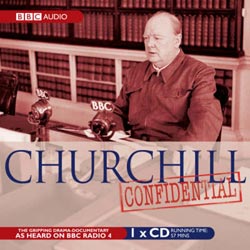|
Click here to return to the main site. Audio Drama Review
The dusty notebooks of wartime cabinet secretary, Norman Brook, had lain unopened for over 60 years, but on their public release the journalist and broadcaster Charles Wheeler helped recreate the mood of Winston Churchill's cabinet meetings in this fast-moving drama-documentary that lets the listener sit in on some of those tetchy cabinet meetings during the darkest days of World War Two... Norman Brook was Cabinet Under Secretary during the Second World War and took personal, handwritten notes of the the exchanges between Prime Minister Winston Churchill and his ministers. The BBC gained exclusive access to his notebooks, and journalist and broadcaster Charles Wheeler recreates the discussions, concerns - and disagreements - of those cabinet meetings. He narrates this compelling drama-documentary that was first broadcast on BBC Radio 4 on the 01 January 2006 - the same day as the notebooks were released to the public. Starring David Ryall as Churchill and Tim Pigott-Smith as Morrison, we hear Churchill arguing with his Cabinet over reprisals against Germany - "If anybody likes to play rough, we can play rough too" - and deciding what information to release to the public about the mass extermination of the Jews, the treatment of the POWs and the Bethnal Green tube station disaster. Startling insights into Churchill's character are revealed, as well as the background to some of the most dramatic decisions that shaped the history of the 20th Century. We hear, in their own words, the disputes and fears that Churchill's cabinet had to struggle with during the darkest days of the Second World War. What is now revealed gives a vivid insight into some of the most dramatic decisions taken by that small group of men who shaped the nation's destiny. Besides the issues of attack and defence, this audio drama also examines the problem that the UK had in a bid to increase coal production. In the end, the answer was to send some young men down to the coalface rather than send them abroad to fight the enemy. There were also unexpected race issues that had to be tackled when the UK started to accept its first American soldiers to its shores. Black soldiers were treated very differently to white soldiers in the US Military and Churchill had to decide how to handle such a tense situation. There seems to be a slight problem with the sound in a couple of places. For example, on the section that details a German airstrike on Exeter the narrator talks over a few lines of dialogue being read by the cast. However as the volumes for both are equal - it makes it difficult to focus on either. However, if you ignore that slight grumble you'll find this to be a historically enlightening insight into some of the major decisions of the war, as well as some of the finer points that are very rarely touched upon elsewhere. 9 Darren Rea Buy this item online
|
|---|


